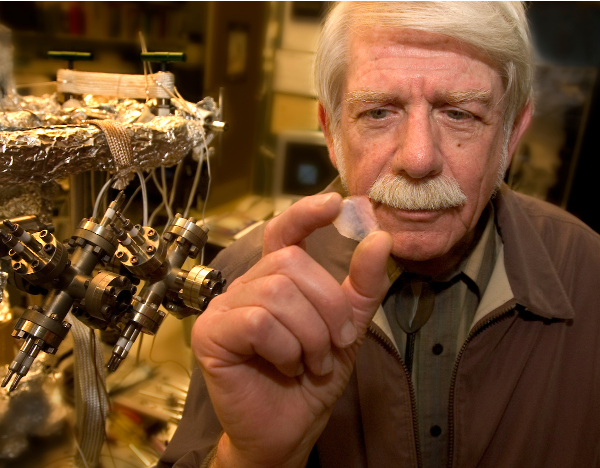Robert O. Pepin, 1933-2023

Professor Emeritus Robert Pepin of the School of Physics and Astronomy passed away on January 6th at the age of 89. Pepin joined the School as a Research Associate in 1965 and then joined the faculty as an Assistant Professor in 1966. He was a Professor of Physics from 1975 until his retirement in 2008. Pepin’s research focused on mass spectrometry. He was a leader in using the isotopes of rare gasses to probe the geology of our solar system, including meteorites, lunar rocks returned during the Apollo missions (in which he played a leading role), and interplanetary dust returned from missions in the early 2000's. He was the director of the Lunar Science Institute from 1974-1975. Pepin was recognized with a host of awards, most recently the Fred Whipple Award from the American Geophysical Union in 2020. After retirement he continued to work as a consultant to NASA on the MARS rover missions as well as other projects.
Pepin’s career included service to the University as director of the Institute of Technology (now the College of Science and Engineering) Honors Program from 1989-2007. In addition to his research accolades, Bob received several teaching awards, including the Morse-Alumni Award for Contributions to Undergraduate Education.
Professor Paul Crowell, Head of the School of Physics and Astronomy said of Pepin, “Bob loved his work and particularly the University of Minnesota and its students. Many of us worked with Bob while teaching the first-year honors course. His rapport with students was extraordinary. He was a gentle and kind human being and an eternal optimist, which was evident in my most recent conversation with him last week. We will miss him greatly.”
Laurence Nyquist (Ph.D. Physics,1969), recalled “I met Bob for the first time on a cold January day in 1965 when he walked into what was then Peter Signer’s lab in the sub-basement of the Physics building. Having just come from sunny California, I think he was a little taken aback by the Minnesota winter. But, he assured me that he had had a big bowl of Cream of Wheat for breakfast (or some such). I learned a lot from Bob in the less than 2 years I took to finish my PhD and move to the then Manned Spacecraft Center. We continued to cross paths professionally for a number of years afterward. But, I most appreciate perhaps that he was able to make such an impact on Minnesota students.”
Dr. David Black (Ph.D. Physics, 1970), President and CEO of the SETI Institute and Deputy Chief for the Space Science Division at NASA Ames Research Center was Pepin’s first Ph.D. student. Black recalled “I first met Dr. Pepin as a senior physics student when he was in charge of a senior lab course. His ability to communicate with the students was rare, maybe because he was only a decade older than us. I stayed at U of M as a grad student and for several reasons, too long for here, I asked if he would be my thesis advisor. As his first thesis student he took time to show me the ropes even though he quickly realized that I was going into theory work after I got my Ph.D. After I graduated he continued to be a positive influence in my life. He was always available and willing to talk with me about career moves, not just as a former advisor, but a friend. His first grad students referred to him as "Dad" for good reason.”
A special School of Physics and Astronomy Colloquium in honor of Professor Pepin will be held on October 19, 2023.